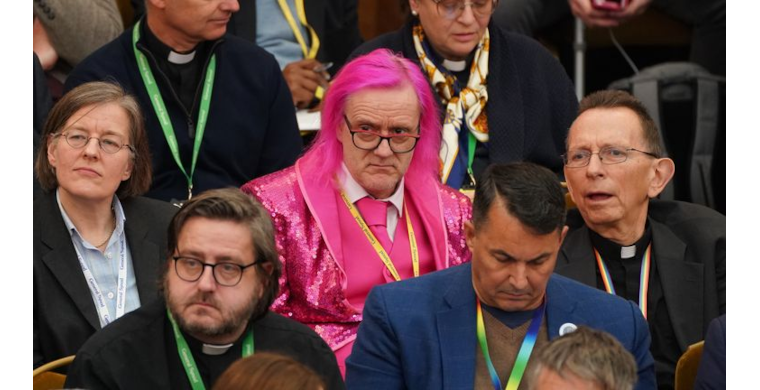We Are Not the Same Religion as the Church of England; We are Christians
By Rollin Grams
February 09, 2023
Today--9 February, 2023--marks the day in history that the Church of England has declared unequivocally by vote in the General Synod, 'We are willing heretics and rejoice.' The general synod had before it a motion to bless same-sex unions and marriages in the liturgy of the Church, and it voted as follows:
Bishops: 36 for, 4 against, 2 abstentions
Clergy: 111 for, 85 against, 3 abstentions
Laity: 103 for, 92 against, 5 abstentions
This means that the majority of bishops, clergy, and laity are agreed on this heretical teaching, calling good what God has called an abomination. Only 9.5% of the bishops, 43% of the clergy, and 46% of the laity are orthodox on this fundamental teaching. The percentages of those voting in favour of blessing sin are miniscule, however, when contrasted to the many bishops, clergy, and laity in the Church over the past 2,000 years of Church history.
Behind this vote on this issue is the rejection of other key teachings of the orthodox Church: that Scripture is the Word of God and the authority in all matters of faith and practice; that the faith delivered once for all to the Church is the faith of the Church, not something to evolve and be refashioned for culture outside the faith; that sin is the human problem, not something to be accepted and welcomed; that the Church is to be holy and without blemish as the bride of Christ; and that the Gospel is not only forgiving grace but also transforming grace as a work of Jesus Christ and the Holy Spirit in our lives. This vote today is a vote against the doctrines of the Church of God, and we must conclude that the Church of England as a denomination does not carry the same convictions and does not practice what we in God's Church affirm and do.
On a similar matter of sexual immorality in the church (both sins, sex with one's father's wife and homosexuality, are mentioned in Leviticus 18), Paul wrote in 1 Corinthians 5:
'Ought you not rather to mourn? Let him who has done this be removed from among you' (v. 2);
'I have already pronounced judgment on the one who did such a thing' (v. 3);
'you are to deliver this man to Satan for the destruction of the flesh, so that his spirit may be saved in the day of the Lord' (v. 5);
'I wrote to you in my letter not to associate with sexually immoral people-- 10 not at all meaning the sexually immoral of this world' (v. 9);
'now I am writing to you not to associate with anyone who bears the name of brother if he is guilty of sexual immorality' (v. 11);
'God judges those outside. "Purge the evil person from among you"' (v. 13).
The Church of England has moved itself into the category of 'bearing the name of brother' (claiming to be Christian) and being 'guilty of sexual immorality' (v. 11) and of affirming those who do such things (Romans 1.32). Paul says,
Though they know God's righteous decree that those who practice such things deserve to die [the penalty in Leviticus 18, 20], they not only do them but give approval to those who practice them (Romans 1.32).
The righteous response of believers to this heretical, majority group is, as Paul says, 'not to associate' (v. 11) with them. Anglicans have in the past used language such as being in an 'impaired relationship' with those promoting certain errors. This language, however, is inadequate and inappropriate in reference to cults or other religions, where disagreement on fundamental matters distinguishes one group from the other at the level of being entirely different religions. Elijah would not have described his disagreements with Baal worshippers on Mt. Carmel as simply 'impaired relationship.' This is where things now are with the Church of England and other groups once in the Anglican Communion that have chosen the path of blessing sin.
The issue of sexual immorality is one that defines whether one is in the Church or in the realm of Satan (v. 5). Those embracing it are excluded from the Kingdom of God (1 Corinthians 6.9-11). We are not in an impaired relationship with the Church of England; we are not the same religion. Our effort must not be framed in terms of restoring the relationship with sinners or 'living in love and faith' with heretics. Over the past many years, our effort has been to go after the lost sheep to show them their sin (Matthew 18.15-20). This process of appeal to sinners ends with 'And if he refuses to listen even to the church, let him be to you as a Gentile and a tax collector' (Matthew 18.17), that is, as someone outside the people of God.
This is where we now are. The Church of England as a body has determined to walk in the counsel of the wicked, stand in the way of sinners, and sit in the seat of scoffers (Psalm 1.1). Blessed is the one who separates himself or herself from them, who delights in the law of the LORD. May the way of the wicked perish (1.6), and may those seeking first the Kingdom and God's righteousness who have lived among these heretics for so long find their way to healthier and righteous community in the Church of God.
Rev. Dr. Rollin Grams is Academic Dean and Professor of Biblical Theology and Ethics at the Oxford Centre for Religion and Public Life and Lecturer and Tutor for the Ridley Institute














